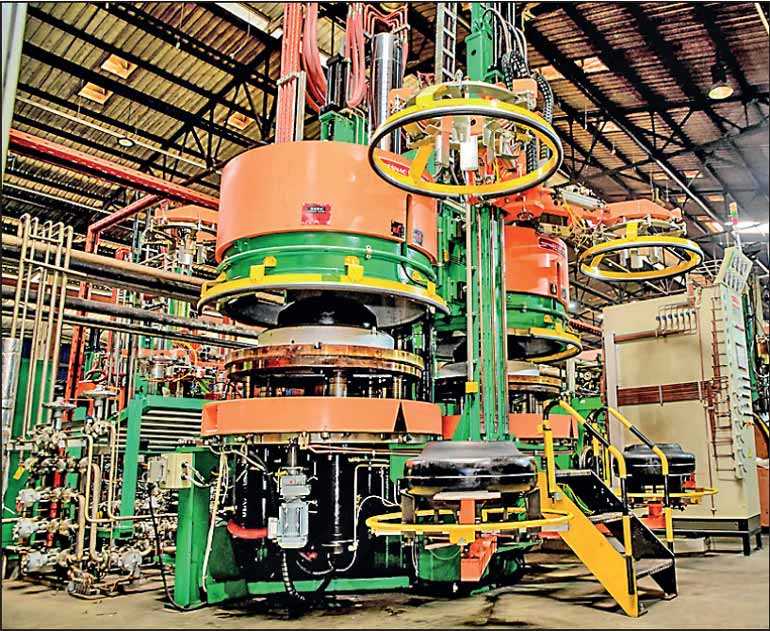Monday Apr 07, 2025
Monday Apr 07, 2025
Wednesday, 24 March 2021 00:18 - - {{hitsCtrl.values.hits}}

CEAT Kelani Holdings yesterday announced that it had increased production of Passenger Car Radial (PCR/van) tyres by 72,000 tyres a year, adding 16% to its annual capacity in this category, as part of its expansion plan to support Government efforts to conserve foreign exchange through domestic production.
This first phase of the planned expansion of PCR tyre production in 2021 is the result of the commissioning of two new tyre presses at CEAT’s manufacturing complex in Kelaniya. The new presses are the first hydraulic tyre presses installed at CEAT’s manufacturing facilities in Sri Lanka and come at a 45% premium over their mechanical counterpart, the company said, disclosing that this upgrade in technology will significantly improve the uniformity of the tyre, the ride and handling parameters and the overall aesthetics of the passenger car radial tyres coming off these presses.
The expansion will see CEAT-Kelani’s total car and van tyre production capacity going up to 500,000 tyres per annum in some of the most popular tyre sizes for rim sizes ranging from 12 to 14, that fit vehicles such as Maruti 800, Suzuki Alto, Estilo, Omni, Swift and Liana, Mahindra Maximo, Nissan Sunny FB15, FB14, N16, March, Bluebird and AD Wagon, Toyota 110, 121, Vios, Soluna, Starlet and Carina, Honda Civic, Hyundai Accent, Perodua (VIVA Elite) and Cherry QQ. Local demand for these tyres is rising, especially in the backdrop of the temporary import restrictions imposed by the Government.
The next phase of CEAT Kelani’s expansion will take place immediately with the addition of two more tyre presses and a tyre building machine, whereby capacity is envisaged to increase by a further 100,000 radial tyres per annum, the company said.
Commenting on these developments, CEAT Kelani Managing Director Ravi Dadlani said: “Our focus in the past one year has predominantly been on strategically ramping up production in specific tyre categories and sizes to cater to market needs and support the national effort to reduce dependence on imports. The travel restrictions necessitated by the pandemic delayed the commissioning of some of the new machines imported for the purpose, but additional radial production is now coming on line and feeding the market.”
CEAT Kelani Holdings increased capacity utilisation across all its manufacturing plants last year, to supply to the domestic requirement of truck, bus, three-wheeler, car, and van tyres with the objective of catering to the demand in the local market in the absence of imports. In August last year, the company, which was already manufacturing about half of Sri Lanka’s tyre requirements, said it had increased production to supply 100% of the passenger bus and goods transport sectors’ tyre needs through domestic production. It estimated that this would save Sri Lanka Rs. 11 billion a year in foreign exchange.
Furthermore, CEAT Kelani also announced the achievement of an 85% increase in the production of tyres for the ‘two-wheeler’ segment over just three months between June and September 2020. Additionally, CEAT Kelani Holdings pushed production of tyres for motorcycles and scooters from 27,000 units a month in June 2020 to 41,000 per month in July and August, and produced 50,000 tyres in September 2020. This was expected to result in a further saving of Rs. 350 million a year for the country.
CEAT Kelani Holdings is considered one of the most successful India-Sri Lanka joint ventures in the manufacturing sector. The joint venture’s cumulative investment in Sri Lanka to date totals Rs. 8 billion, inclusive of Rs. 3 billion committed in January 2018 for expansion of volumes, technology upgrades and new product development. The company’s manufacturing operations in Sri Lanka encompass pneumatic tyres in the radial (passenger cars, vans and SUVs), commercial (bias-ply and radial), motorcycle, three-wheeler and agricultural vehicle segments.
Discover Kapruka, the leading online shopping platform in Sri Lanka, where you can conveniently send Gifts and Flowers to your loved ones for any event including Valentine ’s Day. Explore a wide range of popular Shopping Categories on Kapruka, including Toys, Groceries, Electronics, Birthday Cakes, Fruits, Chocolates, Flower Bouquets, Clothing, Watches, Lingerie, Gift Sets and Jewellery. Also if you’re interested in selling with Kapruka, Partner Central by Kapruka is the best solution to start with. Moreover, through Kapruka Global Shop, you can also enjoy the convenience of purchasing products from renowned platforms like Amazon and eBay and have them delivered to Sri Lanka.
Discover Kapruka, the leading online shopping platform in Sri Lanka, where you can conveniently send Gifts and Flowers to your loved ones for any event including Valentine ’s Day. Explore a wide range of popular Shopping Categories on Kapruka, including Toys, Groceries, Electronics, Birthday Cakes, Fruits, Chocolates, Flower Bouquets, Clothing, Watches, Lingerie, Gift Sets and Jewellery. Also if you’re interested in selling with Kapruka, Partner Central by Kapruka is the best solution to start with. Moreover, through Kapruka Global Shop, you can also enjoy the convenience of purchasing products from renowned platforms like Amazon and eBay and have them delivered to Sri Lanka.